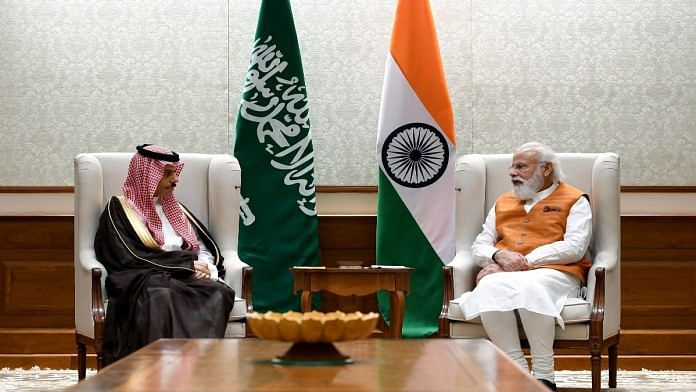An innocuous sounding spat during a television debate has turned out to be a subject matter of international condemnation, knee-jerk reaction and a hotly debated topic on social media. If civility in television news debates, which was once the hallmark of visual media, is difficult to find these days, it is even more difficult to locate the blame for this lack of graciousness and point a finger at the culprit for this. BJP spokesperson Nupur Sharma probably thought it appropriate to vent her anger at her opponent who was ridiculing the icons of her faith. If she was wrong in quoting the Islamic scriptures revered by Muslims in somewhat unsavoury manner, the other panellist’s remarks on Hindu deity was equally inappropriate, and insulting. Both crossed the line and forced the Ministry of External Affairs to work overtime.
Following this spat, Sharma, now suspended from the BJP’s primary membership for six years, received threats to her life, and uncouth remarks were posted against her on social media. Even rewards were announced for her beheading. The Delhi Police had to give her protection and she had to make public appeals not to reveal her address. Considering the gruesome murder of editor and journalists of Paris-based Charlie Hebdo media house by Islamic radicals and many such incidents of death sentences, executions and punishments meted out to people in the name of Islam, there was every need to protect Sharma lest she becomes yet another victim of such lawlessness in the name of religion.
As part of damage control, the Narendra Modi government distanced itself from the controversy and the BJP suspended Sharma and expelled its Delhi media in-charge Naveen Kumar Jindal for posting similarly disparaging remarks against Prophet Muhammad on Twitter. The BJP’s knee-jerk reaction was seen as unwarranted by a large section of the neo-Hindu protagonists. There was a time when the BJP could proudly flaunt its highly trained, suave, sober and good-mannered spokespersons who, above all, were extremely effective in conveying the party’s position without offending the opponents. The party, especially when it is in power at the Centre and many states, probably needs to bring back some of the ‘tried and tested’ spokespersons who would be assertive but not aggressive in media debates.
Also read: Day after saying Doval promised tough action on anti-Prophet remarks, Iran pulls down statement
Duality of Arab nations
At the same time, the BJP and the government should have had their ears to the ground and prepared for the backlash from Islamic countries and organisations. About five Arab nations protested the comments and called Sharma and Jindal’s remarks insulting to their Prophet and faith. Qatar, Kuwait, and Iran summoned Indian ambassadors to lodge a protest, and the Grand Mufti of Oman described the “obscene remarks” as a war on Islam.
Many of these Islamic monarchies, oligarchies and institutions took strong note of the insult to their religion but conveniently overlooked the contemptuous, scornful and disrespectful remarks against Hindu deities and religious symbols. The proverbial last straw on the camel’s back was the irresponsible comments by Pakistan and the Organisation of Islamic Cooperation (OIC), which sought to link the comments to alleged human rights abuse of minorities in India. The Ministry of External Affairs (MEA) strongly and rightly refuted these comments, and pointed out the human right abuses against not only Hindus but also Shias and Ahmediyas in Pakistan. Ironically, the OIC is tight-lipped on the atrocities of Muslims in Xinjiang by China. None of these countries speak about the “worst of the worst” countries that have witnessed systematic and brutal abuses of human dignity and total absence of fundamental rights.
In 1990, the OIC introduced the Cairo Declaration on Human Rights in Islam, which was nothing but ‘Islamic Shariah defined’ human rights totally in conflict with the UN Declaration of Human Rights. Again, in 1999, the OIC introduced resolutions seeking governments to combat Islamophobia. Many Western governments protested saying religious people have the right to protection, not religions. In any case the Arab countries and other Islamic dispensations should restrict their relationship with India to trade, commerce, culture and other mutually agreed aspects of engagement. They should keep away from commenting on India’s domestic socio-political dynamics.
Also read: With much to lose on trade & expats, India works to cool ‘anti-Islam’ anger in Gulf nations
Change with time
Intolerance to criticism is not new among the Muslim community, especially in Europe. In 2020, French President Emmanuel Macron found himself at loggerheads with the local Islamic groups for his comment resolving to “fight radical Islamism, eradicate separatism and uphold secular values at all costs”. There was a spate of terror attacks and a Paris school teacher was brutally murdered prompting Macron to declare that France itself was under attack. France was labelled ‘anti-Islam’ for standing up for the ideals of “Age of Enlightenment” like an equal, integrated, secular and republican society.
Unlike the ‘Christian’ West and ‘liberal’ Europe, India does not see religions as conflicting but respects all them as different paths in the pursuit of one and the same ultimate truth. There has been a healthy practice of not restricting our conversations about the past as ones that rationalise differences on the basis of cultural or historical relativism. The Hindu society has adapted to change and given up a number of social practices that were socially divisive, abhorrent without any scriptural sanctity.
Other religious groups also need to change with time. Any suggestion for change or academically oriented criticism should not be seen as infringement of religious rights by Hindus or Islamophobia by Muslim leadership. A uniform civil law, right to education, inheritance and other fundamental human rights cannot be a subject of religious obligation or treated as munificence of influential religious hierarchy.
The author is the former editor of ‘Organiser’. He tweets @seshadrichari. Views are personal.
(Edited by Prashant)



